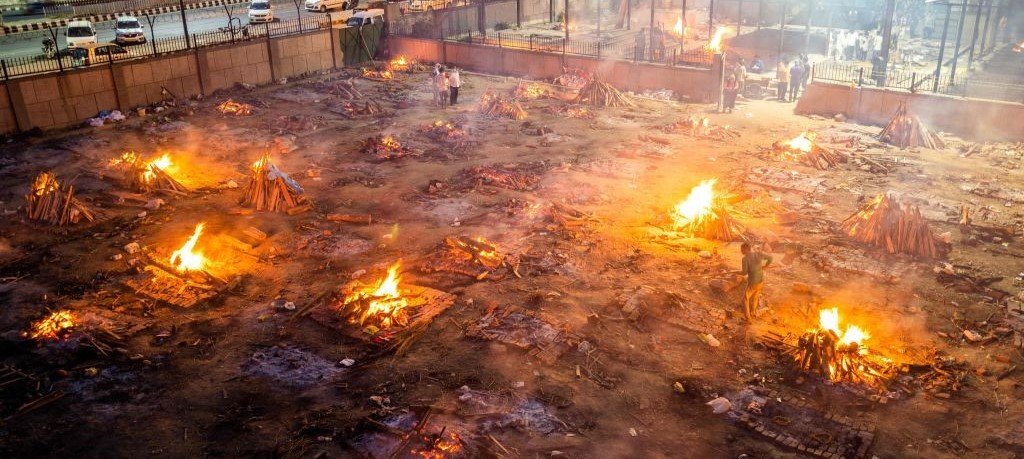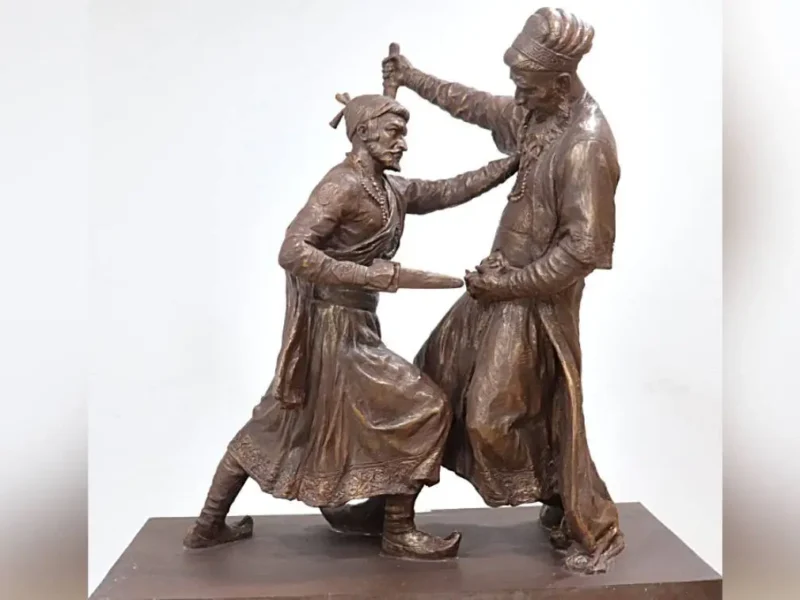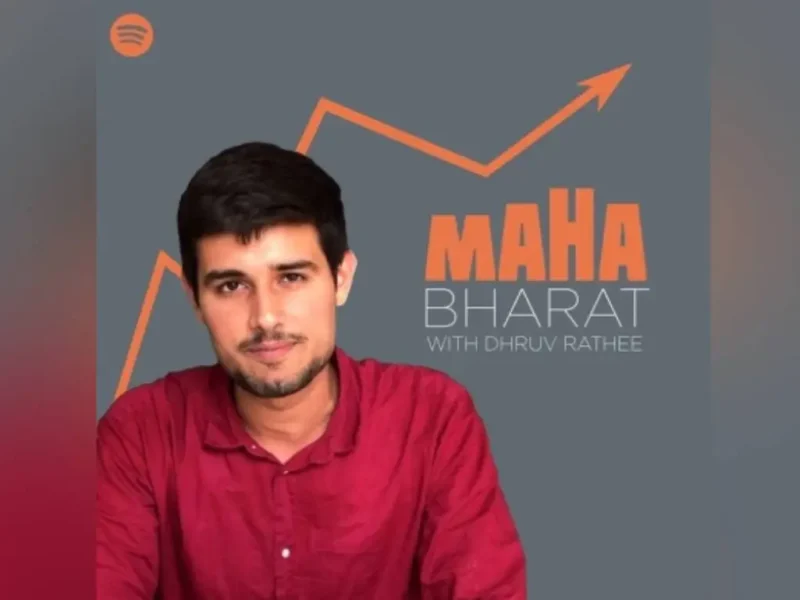
U.S. to Rush Vaccine Raw Materials, Anti-Covid Supplies to India
Men are seen around the burning pyres of victims who lost their lives due to the Covid-19 coronavirus at a cremation ground in New Delhi on April 26. (Jewel Samad/AFP via Getty Images)
ARUL LOUIS/IANS
NEW YORK – In a break from the America First policy, President Joe Biden’s administration is “working round the clock” to immediately send India raw material needed for making Covishield and other products needed in the fight against the COVID-19 surge overtaking the nation, according to National Security Adviser Jake Sullivan.
Recalling the assistance sent by India to the U.S. in the early phase of the pandemic last year, he told India’s National Security Adviser Ajit Doval in a phone call April 25 that “the United States is working around the clock to deploy available resources and supplies,” Sullivan’s Spokesperson Emily Horne said.
Sullivan told Doval that Washington “also is pursuing options to provide oxygen generation and related supplies on an urgent basis,” she said in a readout of their conversation.
The U.S. will also send India anti-COVID supplies like test kits, ventilators, medications, and personal protective equipment used by frontline workers.
The National Defense Production Act invoked by former President Donald Trump banned the export of vaccine raw materials and some other COVID-related products and have continued under Biden.
The decision to lift the embargo for India on the export of vaccine raw materials comes after nearly two weeks of requests from Adar Poonawalla, the CEO of vaccine maker Serum Institute of India, and others in India.
But as recently as April 23, various U.S. government spokespersons would not say if the Biden administration would lift the embargo.
State Department Spokesperson Ned Price said April 22 that the “first obligation” was to the American people and added, “It’s in the interests of the rest of the world to see Americans vaccinated.”
But as calls grew for helping India, Secretary of State Anthony Blinken gave a hint April 24 that India may get the material to fight the pandemic surge.
He tweeted, “We are working closely with our partners in the Indian government, and we will rapidly deploy additional support to the people of India and India’s health care heroes.”
Horne said in the readout, “Just as India sent assistance to the United States as our hospitals were strained early in the pandemic, the United States is determined to help India in its time of need.”
After some physicians had said that hydroxychloroquine could be a treatment for COVID-19, last April Trump had personally asked Prime Minister Narendra Modi to lift his ban on its exports and supply the drug to the U.S.
India sent about 50 million doses of HCQ to the U.S. and thanking Modi, Trump said, “We will remember it.”
Now the next president’s administration is remembering it, even though the emergency use authorization for HCQ’s in hospital settings in the U.S. was withdrawn and a huge cache of it sits unused while Modi’s decision was criticized in India.
India has been sharing its vaccine production with countries around the world, sending nearly 65 million doses to 86 countries.
Horne said, “Sullivan affirmed America’s solidarity with India, the two countries with the greatest number of COVID-19 cases in the world” and they both “resolved that India and the United States will continue to fight the global COVID-19 pandemic together.”
The readout listing what India will receive, said, “The United States has identified sources of specific raw material urgently required for Indian manufacture of the Covishield vaccine that will immediately be made available for India. To help treat COVID-19 patients and protect front-line health workers in India, the United States has identified supplies of therapeutics, rapid diagnostic test kits, ventilators, and personal protective equipment (PPE) that will immediately be made available for India.”
The U.S. is also deploying an expert team of public health advisors from the Center for Disease Control and USAID to work with the embassy in Delhi, India’s Health Ministry, and India’s Epidemic Intelligence Service, the readout said.
USAID, which is the international assistance arm of the U.S., “will also quickly work with CDC to support and fast-track the mobilization of emergency resources available to India through the Global Fund,” it said. The Global Fund is an international collaboration to fight epidemics and serious diseases.
Looking ahead the readout said, “The U.S. Development Finance Corporation is funding a substantial expansion of manufacturing capability for BioE (Biological E), the vaccine manufacturer in India, enabling BioE to ramp up to produce at least one billion doses of COVID-19 vaccines by the end of 2022.”
Biological E, a Hyderabad-based company, is set to conduct phase 3 trials for a vaccine developed by Baylor University and Dynavax Technologies Corporation in the U.S.
At the March summit of Quad, Biden and Modi, along with Prime Ministers Yoshihide Suga of Japan and Scott Morrison of Australia, agreed on a joint plan to help other countries with vaccines that would be made in India with U.S. and Japanese finance and distributed using Australian logistics.
Indian American Democratic members of the House of Representatives Raja Krishnamoorthi and Ro Khanna asked Biden to open the spigot on the excess vaccines for India, but from the readout of the Sullivan-Doval meeting it did not appear that, as yet there was an agreement on the vaccines.
Krishnamoorthi pointed out that the U.S. had about 40 million doses of the AstraZeneca vaccine, which is distributed in India under the Covishield brand name and had begun supplying some of it to Canada and the U.S.
He said that he would “strongly call on the Biden Administration to release millions of AstraZeneca vaccine doses to countries hardest-hit by the spread of COVID-19, including India, Argentina, and potentially others.”
“I applaud the Biden Administration’s decision to put people over profits,” Khanna said welcoming the decision to give India the raw materials and other supplies, and added, “The Biden Administration can still do more, like give India our stockpile of AstraZeneca vaccines that won’t be used in the U.S.”
Biden’s chief adviser on the COVID-19 pandemic, Anthony Fauci, said on a TV program April 25 that sending vaccines to India was under consideration.
ANI adds: U.S. Secretary of Defense Lloyd J Austin III April 25 directed Pentagon to use its resources in order to provide material support to frontline Indian healthcare workers who are fighting against the second wave of COVID-19 pandemic.
“I’m deeply concerned about the COVID-19 outbreak in India, and today, I directed the @DeptofDefense to use every resources at our disposal, within our authority, to support US interagency efforts to provide India’s frontline healthcare workers with the materials they need,” tweeted Austin.
In a statement, Austin said that men and women of the Department of Defense stand by their Indian partners in the hour of need, and they are in this fight together.
“In the next few days, we will provide transportation and logistics assistance to deliver needed supplies to India, including oxygen-related equipment, rapid testing kits, and personal protective equipment,” read the statement.
“We are currently assessing the equipment we can both procure and draw from our own inventory in the coming days and weeks. We will continue to work closely with other U.S. agencies and departments, as well as with industry, to support our Indian partners in their effort to combat this outbreak,” added Austin.
Over three hundred oxygen concentrators were dispatched April 25 morning from New York to India, according to a Government of India official based in the U.S.
Air India’s A102 transported five tons (5,000kg) of oxygen concentrators as cargo from the John F Kennedy International Airport in New York and was scheduled to land in Delhi by April 26 afternoon.
“Apart from this consignment that’s has been shipped by Philips Atlanta, additional flights carrying oxygen concentrators will take off from San Francisco and Newark to transport hundreds of concentrators. The next flight from the U.S. to India is scheduled to depart from Newark Airport and will land in Delhi on April 27,” the Indian Government official told ANI.
The official also noted that the Indian Mission in the United States and Air India are getting requests and inquiries from donors based in the United States to transport not just concentrators but also other medical supplies, including oxymeters.
Meanwhile, U.K. Prime Minister Boris Johnson announced April 25 that “vital medical equipment, including hundreds of oxygen concentrators and ventilators, is now on its way from the U.K. to India to support efforts to prevent the tragic loss of life from this terrible virus.”
The shipment is expected to reach India by April 27. Johnson recently cancelled his India visit due to a surge in the cases of coronavirus.
German Chancellor Angela Merkel also lent her support to India amid the health crisis. Merkel said April 25 that her government was preparing emergency aid for India.
“To the people of India, I want to express my sympathy on the terrible suffering that COVID-19 has again brought over your communities,” Merkel said in a message shared on Twitter by her spokesman Steffen Seibert.
The European Union has also stepped in to support India.
The European Commission has activated its EU Civil Protection Mechanism and is seeking to send oxygen and medicine to India after receiving a request from Delhi.
“Alarmed by the epidemiological situation in India. We are ready to support,” Commission president Ursula von der Leyen wrote on Twitter April 25.
“The EU executive is already coordinating with EU countries that are ready to provide urgently needed oxygen and medicine rapidly,” European Commission for humanitarian aid Janez Lenarcic wrote on Twitter.
Earlier, Australian Prime Minister Scott Morrison expressed his solidarity with India.




